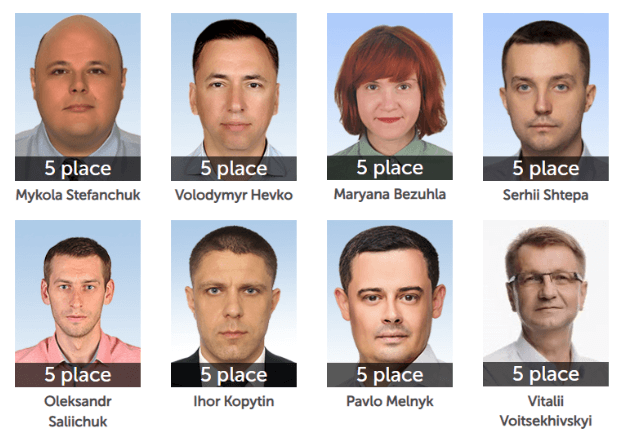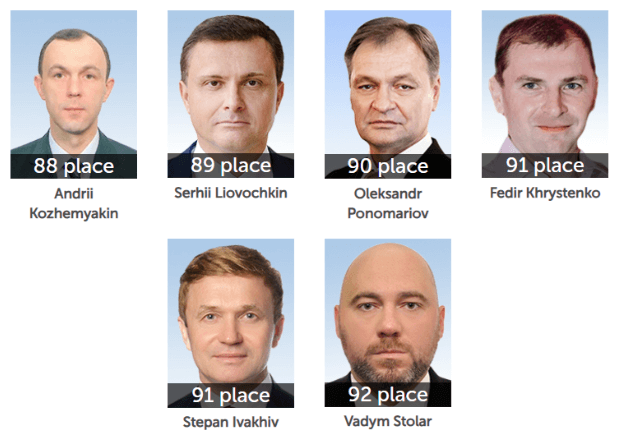Vox Ukraine has assessed the efficiency of people’s deputies since the beginning of the 8th convocation of the Verkhovna Rada based on how each elected representative voted on reform and anti-reform bills. The rankings were last updated in the fall of 2021, following the conclusion of the fifth session of the current Parliament. However, due to a full-scale invasion and various objective reasons, such as Vox’s focus on other challenges and the involvement of the leading analyst of the project in the Armed Forces of Ukraine, we suspended the calculation of ratings for over a year. Today, we are resuming the calculation of rankings for elected officials, providing voters with more data for informed decision-making. We are presenting the updated data for the eight sessions of the Verkhovna Rada.
Important disclaimer
MP efficiency is primarily influenced by the voting results on reform and anti-reform laws listed in the Reform Index table (refer to Methodology). However, we acknowledge that this criterion alone does not encompass all aspects of evaluating MP performance. The law “On the status of people’s deputies” provides a comprehensive list of the responsibilities of MPs. Additionally, considering the reputation of each individual is crucial, including any instances of unethical behavior such as involvement in corruption scandals, voter bribery, or violations related to asset declaration.
Since it is impossible to account for all factors in a single ranking, our focus has been on measuring MP support for significant changes in the economic and socio-political “rules of the game” in the country.
To learn more about people’s deputies, we encourage you to utilize various sources of information, such as journalistic investigations and analytical reports from other public movements. One such resource is the Polithub portal created by the public movement CHESNO, which compiles biographies of numerous Ukrainian politicians, highlighting instances of dishonest or criminal behavior and their voting patterns on detrimental draft laws.
Key findings:
- Overall, the efficiency of Parliament is maintained at an average level of 67±0.5%. This efficiency level is calculated based on the voting patterns of deputies, where 100% efficiency is achieved by a deputy who consistently votes “For” all reforms and does not vote “For” any anti-reform bills.
- Among the newcomers from the Servant of the People faction in the Verkhovna Rada, Oleksandr Vasiuk, Valentyna Korolenko, and Oleksandr Bozhkov have achieved the top three positions in terms of their support for reforms. These deputies have demonstrated high levels of efficiency, ranging from 97% to 100%. It is important to note that only the votes from the last and incomplete penultimate sessions, after these deputies took the oath, were taken into account when calculating their efficiency ratings.
- Andrii Kozhemyakin from Batkivshchyna, Serhii Liovochkin from PFLP, Oleksandr Ponomariov from PFLP, Fedir Khrystenko (formerly from OPFL, now non-factional), Stepan Ivakhiv from For Future, and Vadym Stolar from Restoration of Ukraine have all maintained an efficiency rating of less than 10%. The leaders of the anti-rating have remained unchanged over the course of the parliamentary sessions.
- The group of reformers (efficiency of 89% or higher) decreased from 90 to 84 from the sixth to the eighth session, while the number of moderate reformers increased from 233 to 247. The count of anti-reformers, with an efficiency of less than 40%, decreased by 3 to a total of 74 compared to the previous ranking.
- The Servant of the People faction has consistently maintained a stable efficiency level of 83-85% throughout all sessions of Parliament. The Dovira deputy group has also demonstrated a steady efficiency level ranging from 62% to 68% in recent sessions. However, the Holos faction has experienced a decrease in efficiency from 70% to 63% since the beginning of the convocation. European Solidarity has shown an improvement in their support for reforms, averaging around 53-55% compared to 45% in the second session and 58% in the third session. The remaining factions and groups can be classified as anti-reform in their approach. The Restoration of Ukraine faction has an efficiency level of 34-40%, For Future ranges from 30% to 39%, Batkivshchyna from 28% to 32%, and finally, PFLP ranks the lowest with an efficiency range of 14% to 25%.
- The efficiency of two groups that originated from the banned pro-Russian OPFL faction, namely Restoration of Ukraine and PFLP, has experienced a significant increase. This may indicate either the fear of deputies to vote differently than the Servant of the People mono-majority faction or the existence of an agreement regarding votes to reduce law enforcement agencies’ attention toward the treasonous party’s deputies.
Methodology
The MP Efficiency or Reform Support Index is an online tool used to assess deputies’ performance in the Verkhovna Rada based on their support for the country’s reform agenda.
We get the list of reform and anti-reform laws and their ratings from the Reform Index, another Vox Ukraine project.
How is an MP’s place determined in the rankings? Experts evaluate each law that pertains to reforms on a scale from -5 to +5, considering its anticipated impact on the Ukrainian economy. When a deputy votes in favor of a particular law, they receive the same score that the law received from the Reform Index experts. This score is then added to the deputy’s overall total score. On the other hand, if a law is considered anti-reform and receives a negative rating, voting in favor of that law would lower the deputy’s score.
Therefore, a deputy receives the highest score (100%) if they consistently support reform laws and do not vote for anti-reforms. Abstaining or voting against both positive and negative laws is “worth” 0 points for their score. The efficiency indicator is presented as a percentage, representing the ratio of the points earned by the deputy to the maximum possible points they could have earned during their term in office. For newly elected deputies, each vote has more weight in the overall score. Over time, as the number of laws for which a deputy could vote increases, the weight of each individual law in their overall score decreases.
The rating is cumulative, meaning the final assessment is calculated based on the deputy’s votes from the day they entered Parliament. The overall rating of support for reforms is derived by calculating the average score of all deputies across all parliamentary sessions.
We excluded seven laws from the efficiency calculation due to the unavailability of voting data on the website of the Verkhovna Rada. Signed by the President during the full-scale invasion of the Russian Federation, these laws received a positive assessment from the Reform Index experts.
Furthermore, the efficiency calculation starts from the second session of the current Parliament, as the first session, held on August 29, 2019, lasted only one day.
Change in methodology: In the previous iteration of the efficiency assessment, the rating of factions took into account deputies who had completed their term of office. However, in the current iteration, we have decided to exclude them from the calculation and focus solely on evaluating the effectiveness of the current composition of factions. This adjustment was made because, over time, factions tend to accumulate a growing number of former deputies, which can affect the indicative value of the faction’s efficiency in terms of the current deputies’ performance.
Furthermore, in previous iterations, we included legislation signed by the President during those sessions in the results for each session. This was done to account for instances where the President delayed signing acts adopted by Parliament for several months. However, in this iteration, we calculated the efficiency for all other sessions based on the actual date when Parliament passed the law.
At the time of calculating the rating, it should be noted that not all the laws adopted during the XIII session of the current Parliament had been signed by President Zelensky. However, we plan to include these documents in the next efficiency iteration and recalculate the rating accordingly.
Five people’s deputies, namely Roman Lozynskyi, Roman Kostenko (Holos), Mykhailo Zabrodskyi (ES), Serhii Rudyk (For Future), and Sviatoslav Yurash (Servant of the People), have joined the ranks of the Armed Forces of Ukraine. Yana Zinkevich (ES) is currently working as a commander of the Hospitaliers volunteer battalion. MP Oleksandra Ustinova was on maternity leave from January 2, 2022, to September 6, 2022. Due to objective reasons, they could not regularly attend Verkhovna Rada meetings. As a result, starting from February 24, 2022, the votes of these deputies were not considered if they were absent from the session. This means that if these people’s representatives missed the vote for reform laws, their rating would not decrease.
Additionally, the methodology of the Reform Index has been updated. A new category called “Human capital” has been introduced for normative legal acts. Index analysts have reviewed the categories of specific laws from previous sessions and adjusted them according to the new methodology.
Update from 07.2024: in this iteration of the MP Efficiency rating, the leaders of the Verkhovna Rada (Ruslan Stefanchuk, Oleksandr Korniienko, Olena Kondratiuk) are assigned to the factions in which they were before their appointment on speaker and vice-speakers positions respectively. According to the law, these deputies become non-factional members after the start of their presiding in the parliament. Therefore, in subsequent iterations of MP Efficiency rating, we have changed our approach and do not attribute the leaders of the Verkhovna Rada to factions, that is, they are included in the group of non-factions.
Figure 1 indicates a clear pattern: following the “turbo mode” and subsequent decline in reform activity, Parliament established a relatively steady pace of adopting reforms from the 5th session onwards. Session 7 stands out in particular, coinciding with the commencement of the full-scale invasion. It is worth noting that during this session, Parliament approved 70 reform laws, out of which 63 were considered in the rating (please refer to the methodology for further clarification).
Moving on to the eighth session, which took place between September 2022 and February 2023, Parliament successfully passed 46 laws that were included in the Reform Index. As of March 1, a few additional regulations were still awaiting the President’s signature.
Figure 1. Number of laws included in the Reform Index by session
Source: authors’ calculations for the period from August 29, 2019, to January 3, 2023
After calculating the cumulative rating for all sessions, it was found that, on average, deputies supported the reforms at a rate of 67.5%. This indicates a relatively stable level of support for reforms within the current composition of Parliament. Specifically, the sixth session yielded a rating of 67.0%, while the seventh session recorded a rating of 67.3%. Moving forward, we will delve into the ratings of individual deputies and factions for a more detailed analysis.
See the MP rankings on our website (only Ukrainian version)
Top 3: brand new
The top three positions in the efficiency rating are occupied by “new” people’s deputies who took the oath in 2022. All three of them are members of the Servant of the People faction. Oleksandr Vasiuk holds first place with a 100% efficiency rating, followed by Valentyna Korolenko with 99% and Oleksandr Bozhkov with 97%.
It has been observed that newly sworn-in people’s deputies, who presumably have not had enough time to “spoil their karma,” tend to rank highly in the efficiency ratings. Monitoring their performance in future sessions will provide a more accurate assessment of their effectiveness as MPs.
Consistent supporters of reforms
In the fourth position, with a slight gap from the top three, are four deputies from the Servant of the People faction: Serhii Kozyr, Oleksandr Pasichnyi, Vladlen Nekliudov, and Serhii Kostriichuk, all with a rating of 96%. It is worth noting that this is not the first time these MPs have achieved high rankings. In the seventh session, they were also among the top five. While Pasichnyi and Nekliudov have been serving in Parliament since the beginning of the convocation, Kozyr and Kostriichuk can be considered relatively new additions, as they joined the Verkhovna Rada in November 2021.
In fifth place of the efficiency rankings, with a rating of 95%, are eight MPs from the Servant of the People faction: Mykola Stefanchuk, Oleksandr Saliichuk, Serhii Shtepa, Volodymyr Hevko, Maryana Bezuhla, Ihor Kopytin, Pavlo Melnyk, and Vitalii Voitsehivskyi. These deputies can be characterized as consistent supporters of voting for reform bills, as they all ranked among the top five in terms of efficiency in the last session as well.
Rankings’ outsiders: the same
Six people’s deputies have scored less than 10% efficiency in the rating. They are Andriy Kozhemyakinfrom Batkivshchyna with 9% efficiency, Serhii Liovochkin from PFLP with 8%, Oleksandr Ponomariov from PFLP with 7%, Fedir Khrystenko as a non-factional member with 4%, Stepan Ivakhiv from For Future with 4%, and Vadym Stolar from Restoration of Ukraine with 2%.
These MPs consistently rank as the lowest performers in the efficiency rankings, as they have also occupied the lowest positions in all previous sessions.
Furthermore, twelve MPs previously ranked as low performers lost their mandates in the past two sessions and therefore did not make it into the current rating. Among these were two non-factional MPs, Andrii Derkach, and Dmytro Shentsev, as well as ten members of the OPFL, including Viktor Medvedchuk, Vadym Rabinovych, Ilya Kyva, and others.
Reformers, moderate reformers, and anti-reformers
Based on the level of reform support, we have divided the deputies into three groups:
- reformers with an efficiency rating ranging from 100% to 89%,
- moderate reformers with an efficiency rating ranging from 88.99% to 40%,
- anti-reformers with an efficiency rating of up to 40%.
Figure 2. Transitions between groups in terms of effectiveness during sessions VI, VII, and VIII
Source: authors’ calculations
After the sixth session, which concluded in January 2022, the reformers comprised 90 deputies. It is important to note that all of these deputies, with the exception of non-faction member Roman Sokha, belonged to the Servant of the People faction. However, following the seventh and eighth sessions, the number of reformers decreased to 84, with all of them still belonging to SoP.
After the sixth session, fifteen deputies were removed entirely from the list of reformers. These deputies include Roman Kaptielov, Dmytro Kostiuk, Maryna Nikitina, Artem Kultenko, Artem Kunaeiv, Halyna Mykhailiuk, Ihor Kryvosheiev, Roman Sokha, Serhii Babak, Olha Koval, Artem Chornomorov, Oleksandr Marikovskyi, Yevheniia Kravchuk, Ihor Vasyliv, and Olena Shuliak (they moved to conditional reformers). The rest in the top category were either part of it from the beginning or joined through voting during the seventh or eighth session.
Seven deputies have become reformers and kept their positions during the last two sessions. These are Oleksandr Vasiuk, Valentyna Korolenko, Oleksandr Bozhkov, Anton Shvachko, Tetiana Skrypka, Volodymyr Zakharchenko, Rostyslav Tistyk, and Oleh Arseniuk.
The number of anti-reformers decreased from 77 after the sixth session to 74 after the eighth session. Notably, most reform opponents consistently rank lower in the efficiency rating. During the eighth session, six deputies joined the group of conditional reformers. In contrast, Anatoliy Urbanskyi (For Future), Lesia Vasylenko, and Kira Rudyk (Holos) joined the group of anti-reformers based on their performance during the eighth session.
Among the anti-reformers, the PFLP and Batkivshchyna factions are the most represented, with 21 deputies each, as shown in Figure 3.
Figure 3. Distribution of factions based on the level of support for reforms
Source: authors’ calculations
The group of conditional reformers expanded from 233 to 247 people’s deputies, mainly due to the transition from the reformist group.
How the factions have supported reforms since 2019
We will now evaluate the results of the factions’ work after each session (Figure 4).
Figure 4. The efficiency of factions/groups after each of the sessions
Source: authors’ calculations
Among the Servant of the People MPs, the efficiency remained stable throughout their time in office, ranging from 83% to 85%.
The Dovira Group started with an efficiency of 48% and gradually increased it to 68%. This suggests they quite often vote in unison with the Servants in favor of change-making legislation.
On the other hand, Holos experienced a gradual decrease in efficiency from 71% after the second session to 63% after the eighth session.
During the second and third sessions, European Solidarity demonstrated 45% and 58% efficiency, respectively. In the subsequent sessions, they maintained 53% to 55% efficiency.
The Restoration of Ukraine MP group, mainly consisting of former members of the banned pro-Russian OPFL faction, had relatively low-efficiency scores, ranging from 34% to 39% during the second to seventh sessions. However, in the eighth session, their efficiency increased to 40%.
A similar trend was observed in the anti-reform PFLP parliamentary group, also comprised of former OPFL members. Although their efficiency had been 14% to 19% in previous sessions, it increased to 25% after the eighth session. There are two possible explanations for this trend. First, the deputies from the Restoration of Ukraine and PFLP may have become more cautious about voting differently from the Servant of the People faction, as their support is crucial in achieving the necessary 225 votes. Second, they could have agreed to provide their votes in exchange for reduced attention from law enforcement agencies or the National Security Council regarding their involvement with the treasonous party.
The For Future Deputy Group started its term with an efficiency of 39%. However, their efficiency decreased to 30% during the subsequent two sessions. From the fourth to the eighth sessions, their efficiency remained within the 33% to 38% range, which still categorizes them as anti-reformers.
Batkivshchyna, another faction in the group of opponents of reforms, has an efficiency ranging from 28% to 32%.
Be reminded that the rating of support for reforms is calculated based on the current composition of the factions. This means that the efficiency of a particular faction after the third session reflects how the deputies who are currently part of that faction, on average, voted for change-making laws during the 3rd session.
MP effectiveness regarding reforms
Depending on the area a law addresses, Reform Index analysts assign it to one or more of the 30 categories, such as “Government Procurement” or “Banking Sector.” This categorization also allows us to compare how different factions have supported specific areas of change.
Figure 5. The efficiency of factions by reform area
Servant of the People demonstrated strong support for reforms across various categories, with an efficiency of 76% or higher in most areas. However, they scored lower in the categories of “Energy independence” (67%) and “Competitive policy” (16%). Among the reform categories, “Competitive policy” received the least support overall from parliamentarians, while social protection (20 laws) and culture (2 laws) garnered the MPs’ highest level of support.
Dovira has shown support ranging from 51% to 80% in each reform direction. Notably, they provided more robust support for laws in the categories of “Foreign exchange regulation” (83%) and “Corporate governance” (91%). However, Dovira MPs had an efficiency of less than 50% in four categories: “Tax system,” “State procurement,” “State debt management,” and “Competitive policy.”
Holos maintained relatively high efficiency in 21 categories, ranging from 56% to 85%. Notably, they scored 94% in the “State Debt Management” category. However, their efficiency was lower in six categories, ranging from 29% in the “State Service” to 46% in “Culture.”
ES achieved the highest efficiency in the “Effectiveness of public expenditure” category with a score of 67%. They also had more than 50% efficiency in 15 other categories. However, their support was lower in the remaining 21 categories, ranging from 0% to nearly 50%. Notably, ES scored 0% in four categories: “Public debt management,” “Currency regulation,” “Independence of the National Bank of Ukraine,” and “Corporate governance,” indicating that they did not vote in favor of the laws in these areas, which had 1-2 regulations each.
Restoration of Ukraine, For Future, Batkivshchyna, and PFLP did not show significant variations in support for specific reform directions since almost all voted equally poorly. However, there were some “abnormal” votes in particular categories:
- The Restoration of Ukraine group actively supported laws in the “Labor Market” category with a 63% efficiency, mainly focused on providing assistance to the unemployed. They also had a higher support rate in the “Culture” category with a 70% efficiency, particularly regarding laws on the ban of Russian cultural products and the provision of paid services by cultural institutions;
- The For Future group supported one law in the “State Debt Management” category, with a 67% efficiency;
- the Batkivshchyna faction supported three laws in the “Other” category of the “Business Environment” with a 70% efficiency;
- the PFLP group supported four laws in the “Other” category of “Human capital” with a 65% efficiency, particularly in the ratification of the Istanbul Convention.
The For Future, Batkivshchyna, and OPFL factions received negative results in the “Competitive Politics” category, indicating their voting against reform legislation in this area. For Future had an efficiency of -11%, Batkivshchyna had -7%, and PFLP had -6%.
Conclusions
The overall level of support for reforms in Parliament has remained relatively stable at around 67%, with a small variation of ±0.5% over several sessions. However, the number of active reformers in the Verkhovna Rada decreased from 90 in the sixth session to 84 in the eighth session. On the other hand, the number of anti-reformers also reduced from 77 to 74, while the number of moderate reformers increased from 233 to 247.
Regarding factional support for reforms, Servant of the People has the highest level of support at 84%. The second-place position shifted from Holos (previously third with 63%) to Dovira with 68% efficiency. The European Solidarity faction remains at an “average” efficiency level of 53%. The factions with the lowest support for reforms are Batkivshchyna at 28%, For Future at 38%, and the former OPFL faction, which is now divided into two groups – Restoration of Ukraine at 40% and PFLP at 25% – both being anti-reform in nature.
The average level of support for reforms by factions in the temporal dimension has almost not changed. While some factions experienced noticeable fluctuations at the beginning of the mandate, their support for reforms eventually stabilized. However, it is worth noting that the former MPS from the now-banned OPFL faction have shown an increase in efficiency over time. We assume that these deputies may either be afraid to vote differently from the majority faction or have reached certain agreements with SoP, voting for “necessary” laws in exchange for “peace and protection” from law enforcement agencies. Regardless of the reasons, we believe that all former people’s deputies of the OPFL faction, deemed treasonous, should be held accountable for their actions and subsequently leave the Verkhovna Rada.
Since Ukrainians understand the need to implement reforms even despite the war, people’s deputies must take a responsible approach to voting and support essential changes in the country. In turn, citizens should monitor the activities of their people’s elected officials in order to understand whether it is worth voting for them in future elections.
Attention
The authors do not work for, consult to, own shares in or receive funding from any company or organization that would benefit from this article, and have no relevant affiliations








